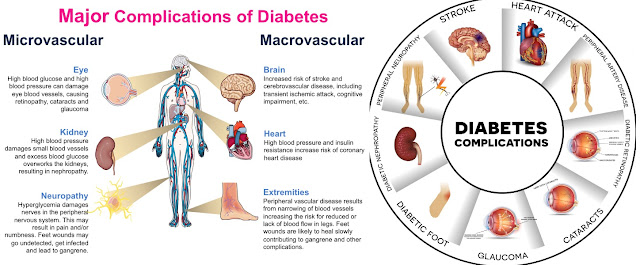Diabetics must always control the blood glucose/sugar levels regularly, keeping the diet, regulate body weight and do a checkup regularly. The pattern of life as it is very necessary to prevent the onset of diabetes complications.
Always control the level of glucose in the blood and consult your physician about handling diabetes the right, so that the patient does not fall within the conditions of hypoglycemia.
Complications of diabetes are often associated with damage to the blood vessels. Diabetes in the long term can reduce the amount of blood flow to different parts of the body, such as eyes, kidneys, nerves, tissues, causing a constricted blood vessel. As a result, the body part is damaged by a serious and life-threatening function.
Others Complications, may occur because of diabetes:
Heart and vascular stenosis include several problems related to diabetes:
In addition to some of the aforementioned complications, these diseases also have the potential to occur in diabetics in the long term:
READ: The Onset of Diabetes
Complications of Diabetes
Short Term Complications
The disease of diabetes mellitus can be followed by a variety of complications. In the short term, diabetes can lead to:Hyperglycemia (Hyperglycemia)
Hyperglycemia or high blood sugar in a long time can cause damage to tissue and organs. Complications can occur if the patient does not take measures to reduce the level of glucose in the blood such as the injection of insulin, or because due to diet and life that is not oriented in the handling of the disease diabetes. Hyperglycemia is a serious condition and needs a medical course of action as soon as possible.Hypoglycemia (Hypoglycemia)
In some cases, diabetics do wrong and excessive handling so that the level of glucose in the blood becomes too low. Skip the hours eating and exercise and consume drugs diabetes (decrease glucose levels) or do the injection of insulin may cause hypoglycemia.Always control the level of glucose in the blood and consult your physician about handling diabetes the right, so that the patient does not fall within the conditions of hypoglycemia.
Ketoacidosis
Ketoacidosis is a complication of diabetes that occurs when the body is not able to use glucose/blood sugar as energy due to lack of insulin. When the cells of the body lack energy, they will use the fat as energy reserves. When fatty tissue is compromised, resulting in ketone substances (toxins) in the body. This condition could result in difficulty breathing, severe abdominal pain, as well as dehydration.Long-term Complications
The longer a person suffers from diabetes, the higher the risk of complications experienced due to high glucose in the blood. Good handling can prevent the onset of complications, or the patient is getting better control of glucose levels remain normal then the small stakesComplications of diabetes are often associated with damage to the blood vessels. Diabetes in the long term can reduce the amount of blood flow to different parts of the body, such as eyes, kidneys, nerves, tissues, causing a constricted blood vessel. As a result, the body part is damaged by a serious and life-threatening function.
Others Complications, may occur because of diabetes:
Eye damage
Diabetes can cause a variety of cataract, glaucoma, retinal damage, and blindness, and could damage the blood vessels in the eye.Skin and foot problems
Diabetics are especially susceptible to their foot problems. The destruction of nerve tissues and blood vessels restricts the flow of this area. Scratches on the legs and small scratches on the skin makes for a very serious infection of the easily scratched. Without serious attention, the cut is more widespread and destructive. Under the worst conditions, this section should be disconnected so that the infection does not spread further.Heart problems
People with diabetes are exposed to high risk of heart problems. Researchers said the risk of heart attack in diabetics would be equal to anyone who had ever had a heart attack.Heart and vascular stenosis include several problems related to diabetes:
- Stroke
- Damaged arteries
- Hypertension
- High cholesterol levels
- Nerve
- Excess sugar in the body can damage the nerves and blood vessels in the chain of feet or hands and cause sensations such as tingling, numbness, pain, and burn.
In addition to some of the aforementioned complications, these diseases also have the potential to occur in diabetics in the long term:
- Skin infections
- Urinary tract Infection
- Failure
- Erectile dysfunction.

Comments
Post a Comment